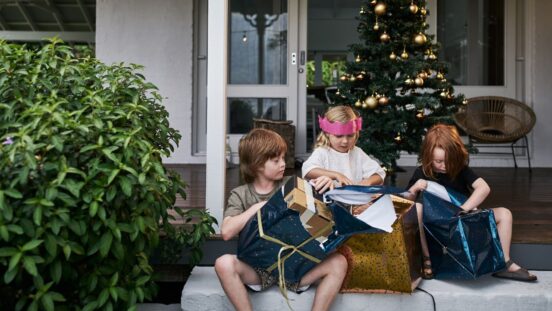Parenting Educator Genevieve Muir shares her foolproof tips to raising an emotionally intelligent toddler
Connection with our kids comes in many different forms, and can be as simple as getting on the floor and joining them in play, or as brief as a wink, a hug, or the outward joy we show as they enter the room.
By Gen Muir, founder of Connected Parenting
As a parenting educator, some of the most frequently asked questions I get are often along the lines of “How can I raise my child to be kind and considerate” or “How can I grow resilience, confidence and bravery in my kid?” And the big one, “How can I raise a happy child?”
The answer to these questions, and everything that parents want for their kids is directly linked to children having a good understanding of their own emotions and their ability to relate to others – skills that are commonly understood as emotional intelligence or EQ.

Genevieve Muir is the founder of Connected Parenting, an Obstetric Social Worker, Parent Educator and mum to four boys with a passion for helping parents in the first five years of raising kids.
With the biggest indicator of happiness and success linked to our ability to effectively manage emotions and develop relationships, it’s never been more important to help our little humans foster EQ skills. Here are my top five tips on how you can help to raise a happy, healthy little one in and amongst the the hustle and bustle of modern living.
Gen Muir’s top 5 tips to raise a happy child
1.Never forget the importance of connection
It’s widely believed that adults have five love languages, yet when it comes to children, they really only process love as one thing: Feeling connected with their parents or primary caregivers. Connection is so important for kids in fostering EQ simply because it forms the foundations of their own self worth and their ability to feel intrinsically lovable and worthy of love.
Connection with our kids comes in many different forms, and can be as simple as getting on the floor and joining them in play, or as brief as a wink, a hug, or the outward joy we show as they enter the room.
Our kids feel the most connected with us when we spend dedicated time with them. One of the biggest tips I can give parents when they’re looking to foster this connection is to set aside 10 minutes of one on one, distraction free, child led special time with their little ones. You can do anything during the 10 minutes, from playing with LEGO DUPLO bricks to reading their favourite books.
We are their first relationship, and when we let them know, even in just 10 minutes together, that we just love spending time with them, everything else seems to go better.
2. Let your kids struggle and fall
As a parent, we all know how quickly the words ‘be careful’ or ‘watch out’ have become a big part of our vocabulary. While sometimes necessary, it’s also important that we let our kids learn how to navigate risk. When parents however or prevent their children from making risky choices, kids don’t get a chance to learn about consequences.
It’s through the experience of frustration your toddler may have as they’re learning to click two toy bricks together, or the tears after they’ve scraped their knee that they get to learn the EQ skills of bravery and resilience.
3. Learn to embrace the big feelings
One of the biggest things a parent can do to grow these precious EQ skills in their child is to become an ‘emotion coach’. This means having to model the ability to stay calm and manage our emotions when our kids can’t – AKA, we don’t join in on the tiny humans melt down.
Being with a child who is really, really upset isn’t easy for anyone. As a mum of four boys, I know how hard it is to stand by when your kid is having a huge meltdown. But the evidence tells us that the best way to build resilience, compassion, kindness and so many other EQ skills for our children is to show them that they’re allowed to feel big feelings, and are welcome to come to us when they’re happy or sad – all emotions are healthy.
When dealing with these emotions, it helps to remember that, like us, our kids just want to be seen and heard. And once our kids are calmer, we can talk with them about these big feelings and help them understand where these emotions have come from. These conversations where we help them to identify the feelings behind the behaviour are often as insightful for them as they are for us as we learn together.

Gen Muir is currently working with LEGO DUPLO to show how DUPLO offers toddlers a big start in life through meaningful play and endless fun.
4. Lean in to the word ‘no’
Boundaries are just as essential for kids as connection, warmth and love. And while kids do need opportunities to express themselves, they also need us to occasionally step in and lead with kindness, firmness and confidence with the word ‘no’.
It’s in this ‘no’ that kids are learning about navigating relationships, and that even though we love them, there are limits. This is essential in teaching our kids to be kind and considerate, and evidence also shows, in making them feel safe and loved.
5. Always say sorry when you stuff up
Parenting is an absolute gift, but my goodness it can be so hard! We all get crabby and tired, and we all snap, or forget things that matter to our kids, even the most important things.
Evidence shows that kids don’t need parents who never make mistakes, but rather parents that are willing to go in and repair the relationship when things get off track. As a mum, I’ve had some truly beautiful moments of connection with my kids following a moment where I was not the parent I wanted to be. When I’ve made a mistake or snapped at my kids, I always say sorry.
Saying sorry to our kids is about recognising that we all make mistakes, and relationships require us to work to repair them when they get off track. There is no better way to teach your child humility, compassion, vulnerability, and kindness than when we model all these things by talking to our child and say “I’m sorry, can we try that again”.




